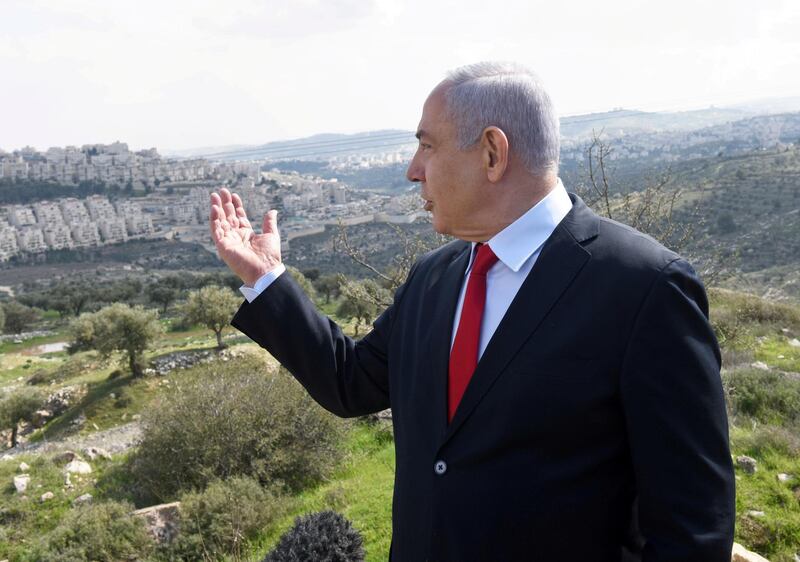Israeli Prime Minister Benjamin Netanyahu on Sunday said he was confident he would be able to annex large parts of the occupied West Bank this summer, with support from the US.
Addressing an online gathering of evangelical Christian supporters of Israel, Mr Netanyahu said US President Donald Trump's Middle East plan envisions turning over dozens of settlements, and the strategic Jordan Valley, to Israeli control.
"A couple of months from now, I'm confident that that pledge will be honoured, that we will be able to celebrate another historic moment in the history of Zionism," he said.
Israeli annexation of West Bank territory would draw wide international condemnation and extinguish any hopes of a viable independent Palestinian state alongside Israel.
The Palestinians seek the entire occupied West Bank as part of an independent state.
They have threatened to cancel existing peace agreements if Mr Netanyahu moves forward with his plan.
EU foreign policy chief Josep Borrell said annexation would be a breach of international law and force the bloc to "act accordingly".
The UN's Middle East envoy said such a step would "ignite" the region.
But Mr Netanyahu and his hardline base are eager to move ahead while Mr Trump remains in office.
Annexation would be popular with Mr Trump's evangelical base as he seeks to shore up support before a difficult re-election battle.
In Washington, a US official said the American position had not changed.
The official said the US was "prepared to recognise Israeli actions to extend Israeli sovereignty" in parts of the occupied West Bank.
The US was consulting closely with Israel on the timing and scope, the official said.
Mr Netanyahu last week reached a power-sharing deal with his main rival, Benny Gantz.
Although Mr Gantz, a former Israeli military chief, has given only lukewarm support for West Bank annexation, their coalition agreement allows Mr Netanyahu to present the plan to his Cabinet and Parliament for fast-track approval.
Israel captured the occupied West Bank in the 1967 Arab-Israeli war, and its settlements are now home to about 500,000 Israelis, in addition to more than 200,000 in occupied East Jerusalem.
After Mr Trump unveiled his Middle East plan in January, Mr Netanyahu pledged to start annexing territory immediately.
But the Trump administration quickly delayed the annexation and the sides set up a joint committee to formulate a plan together.
Mr Netanyahu addressed a conference marking the 100th anniversary of the San Remo Conference, a gathering in Italy after the First World War, helped to lay the foundations for Israel's establishment in 1948.
Palestinian officials offered no immediate comment on his remarks.
Palestinians have flatly rejected Mr Trump's proposal, partly because it awards Israel most of what it has sought during decades of conflict, including nearly all of the occupied land on which it has built settlements.
US Secretary of State Mike Pompeo said on Wednesday it was up to Israel whether to annex parts of the West Bank and that Washington would offer its views privately to its new government.
The Palestinians and many countries consider Israel's settlements in the occupied West Bank to be illegal under the Geneva Conventions that bar settling on land captured in war.
Israel disputes this, claiming security needs and biblical, historical and political connections to the land.







